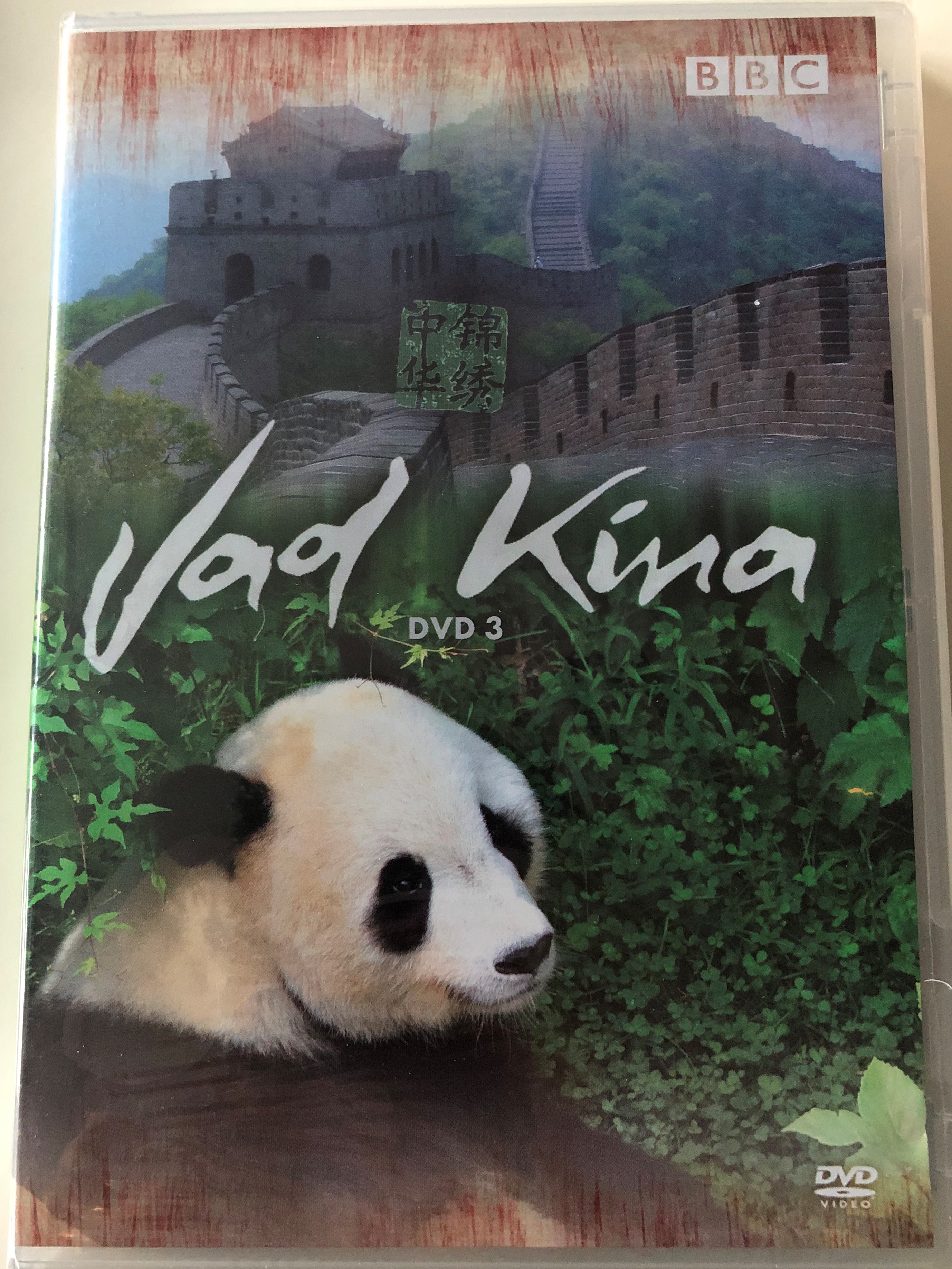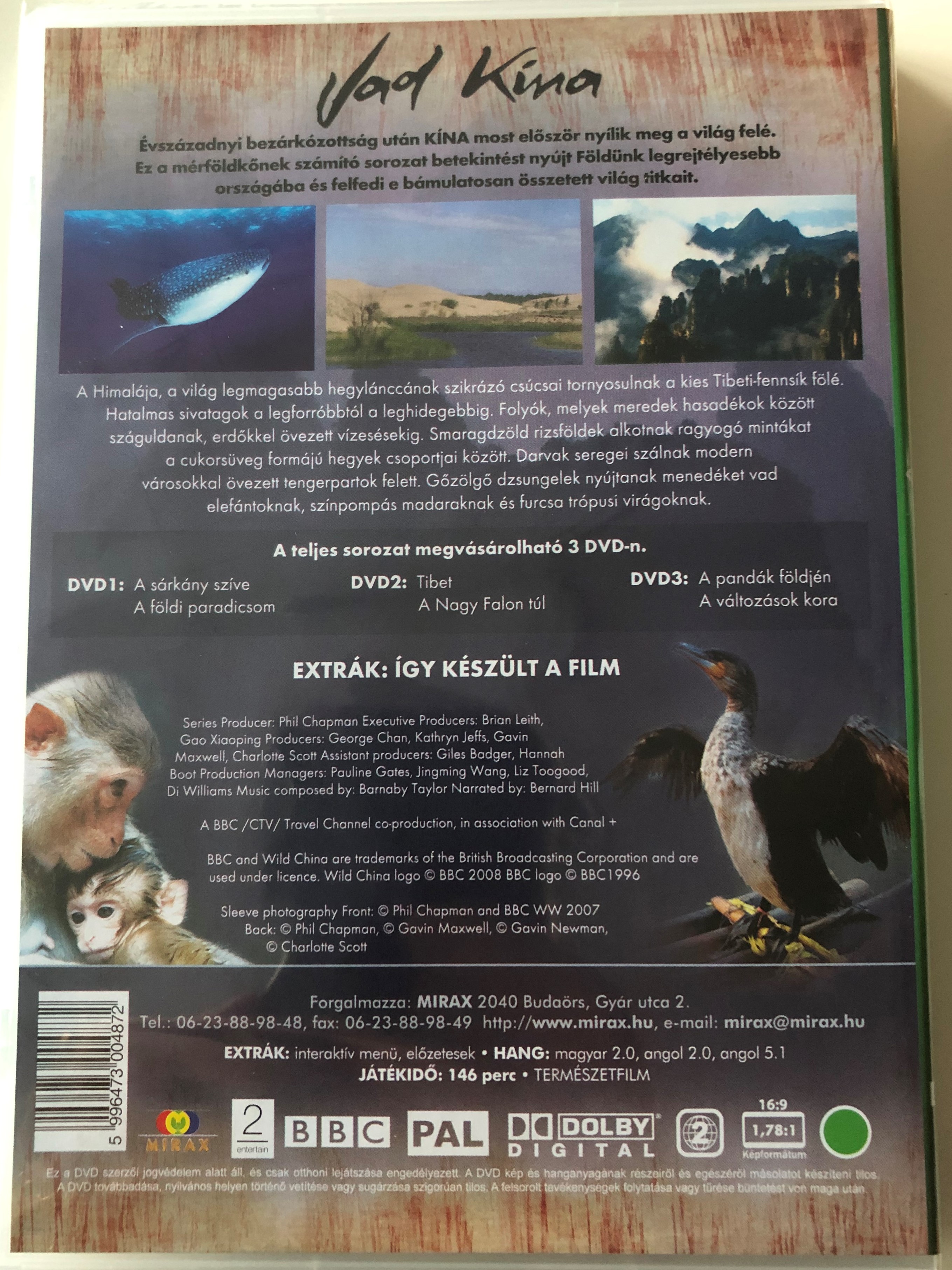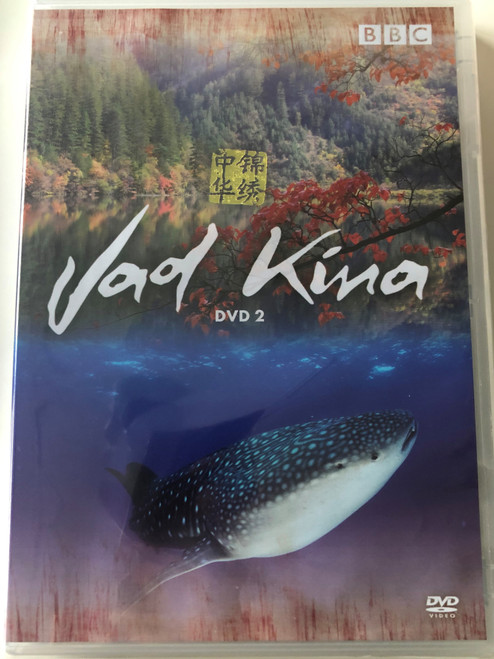Product Overview
Wild China 3. DVD 2008 Vad Kína 3. DVD / BBC Nature Documentary Series / Narrated by Bernard Hill, David Suzuki / Executive producer: Brian Leith
UPC 5996473004872
MADE IN HUNGARY
REGION 2 PAL DVD
AUDIO: English 2.0, English 5.1, Hungarian 2.0
Total Runtime: 146 minutes
DISC 3
English Summary:
Wild China is a six-part nature documentary series on the natural history of China, co-produced by the BBC Natural History Unit and China Central Television (CCTV) and filmed in high-definition (HD). It was screened in the UK on BBC Two from 11 May to 5 June 2008. The English narration was provided by Bernard Hill and the series produced by Phil Chapman for the BBC and Gao Xiaoping for CCTV. The Chinese version was broadcast under the title Beautiful China. In Canada, it was broadcast on CBC as part of the series The Nature Of Things narrated by David Suzuki. Wild China was broadcast in Australia on ABC1 and ABC HD each Sunday at 7:30pm from 18 May 2008.
The musical score to accompany the series was composed by Barnaby Taylor and was performed by Cheng Yu and the UK Chinese Ensemble.
The series was billed as the culmination of the BBC Natural History Unit's "Continents" programmes, a long-running strand of blue-chip wildlife documentaries which surveyed the natural history of each of the world's major land areas. It was preceded by Wild Caribbean in 2007, but with the broadcast of South Pacific in 2009 the BBC signalled a continuation of the strand.
Episodes on DISCS:
DISC 3
5 "Land of the Panda"
The fifth installment features central China, home to the Han Chinese. They are the largest ethnic group on Earth, and their language Mandarin the most widely spoken. The programme looks at how the relationship between people and wildlife has changed over time. Ancient Chinese beliefs placed great importance in the harmonious co-existence of man and nature. At the beginning of China’s period of rapid economic growth, this ideal was largely forgotten. A number of political references contrast the more enlightened environmental policies of the current government with those under Chairman Mao Zedong, which led to widespread degradation. The Chinese alligator and crested ibis are two species saved from extinction by direct intervention. Other animals have benefited from ancient spiritual beliefs and customs which live on, promoting respect and reverence for wildlife: the yellow weasels and Mandarin ducks of Beijing are two such creatures. However, wildlife is still threatened by illegal poaching for food and traditional medicine. West of Beijing lie the fertile lands of the North China Plain and the Loess plateau, source of the Yellow River. Increased demand for water has changed the river’s flow, and soil erosion causes dust storms which reach the capital. Further west, the Qinling Mountains are a refuge for some of China’s rarest species including the takin, golden snub-nosed monkey and giant panda. Giant panda courtship and mating is shown, filmed for the first time in the wild. In the colourful lakes of Jiuzhaigou, unique fish swim amongst forests preserved underwater.
6 "Tides of Change"
The final programme features China’s 14,500 km coastline, home to 700 million people. Despite decades of rapid urban development, it is still an important migration route for birds. Endangered red-crowned cranes depart their northern breeding grounds to overwinter at Yancheng salt marsh, the largest coastal wetland in China. Shedao Island is an important stopover on the migration route, but the resident Shedao Island pitvipers, stranded by rising sea levels, lie in ambush in the branches. A snake strikes a songbird, and another is filmed swallowing a kingfisher. All along the coast, traditional forms of cultivation allow wildlife and people to live side by side. Crops vary from seaweed and cockles in the north to prawns further south, allowing birds such as whooper swans and black-faced spoonbills to prosper. Kejia tea-growers and Hui'an women harvesting oysters are also shown. China’s rivers and seas are heavily polluted. Sewage and fertiliser washed into the Bohai Gulf cause plankton blooms, attracting jellyfish, which in China are a commercial catch. In the Yangtze estuary, the migrations of creatures such as Yangtze sturgeon and mitten crabs are being impeded by upstream dams. In the tropical South China Sea, where coral reefs are under threat, whale sharks are rare visitors. Other rare creatures filmed include Pere David's deer and Chinese white dolphins. On Hainan island, macaques are shown jumping into a hotel swimming pool, epitomising the uneasy coexistence of wildlife and people in China, and the challenge of continuing its traditional harmonious relationship with nature.
Hungarian Summary:
Évszázadnyi bezárkózottság után, Kína most először nyílik meg a világ felé. Ez a mérföldkőnek számító sorozat betekintést nyújt Földünk legrejtélyesebb országába, és felfedi e bámulatosan összetett világ titkait. A Himalája szikrázó csúcsai – a világ legmagasabb hegylánca – tornyosulnak a kies, Tibeti fennsík fölé. Hatalmas sivatagok a legforróbbtól a leghidegebbig. Folyók, melyek meredek hasadékok között száguldanak, erdőkkel övezett vízesésekig. Smaragdzöld rizsföldek alkotnak ragyogó mintákat a cukorsüveg formájú hegyek csoportjai között. Darvak seregei szállnak modern városokkal övezett tengerpartok felett. Gőzölgő dzsungelek nyújtanak menedéket vad elefántoknak, színpompás madaraknak és furcsa trópusi virágoknak. Jöjjön velünk egy elképesztő utazásra lélegzetelállító tájakon át, a Himalája csúcsaitól a kopár sztyeppékig, a sark közeli fagyoktól a trópusi szigetekig! Nagy felbontású kamerák rögzítették a titokzatos és csodálatos, vad és ritka lényeket, valamint a legkülönbözőbb társadalmi formákban élő népcsoportok életét.
A sorozatból megismerhetjük számos elképesztő és elkápráztató, ritka és gyönyörű teremtményét Kínának, ami a Himalája fehérlő csúcsaitól forró és jéghideg sivatagon át, forró és fülledt dzsungelig mindent felvonultat, ami csak földrajzilag lehetséges.
EPIZÓDOK / 2 Episodes on this DVD:
DVD 3:
A Pandák földjén / Land of the Panda
A változások kora / Tides of Change
| Also known as | Beautiful China (Chinese title) |
|---|---|
| Genre | Nature documentary |
| Narrated by | Bernard Hill (BBC) David Suzuki (CBC) |
| Composer(s) | Barnaby Taylor |
| Country of origin | United Kingdom/China |
| Original language(s) | English/Chinese |
| No. of episodes | 6 |
| Production | |
| Executive producer(s) | Brian Leith |
| Producer(s) | Phil Chapman (BBC) Gao Xiaoping (CCTV) |
| Production location(s) | China |
| Running time | 384 minutes |
| Production company(s) | BBC Natural History Unit CCTV |
| Release | |
| Original network | BBC Two |
| Picture format | SD: 576i HD: 1080i |
| Audio format | SD: Stereophonic HD: Dolby Digital 5.1 |
| Original release | 11 May – 15 June 2008 |










